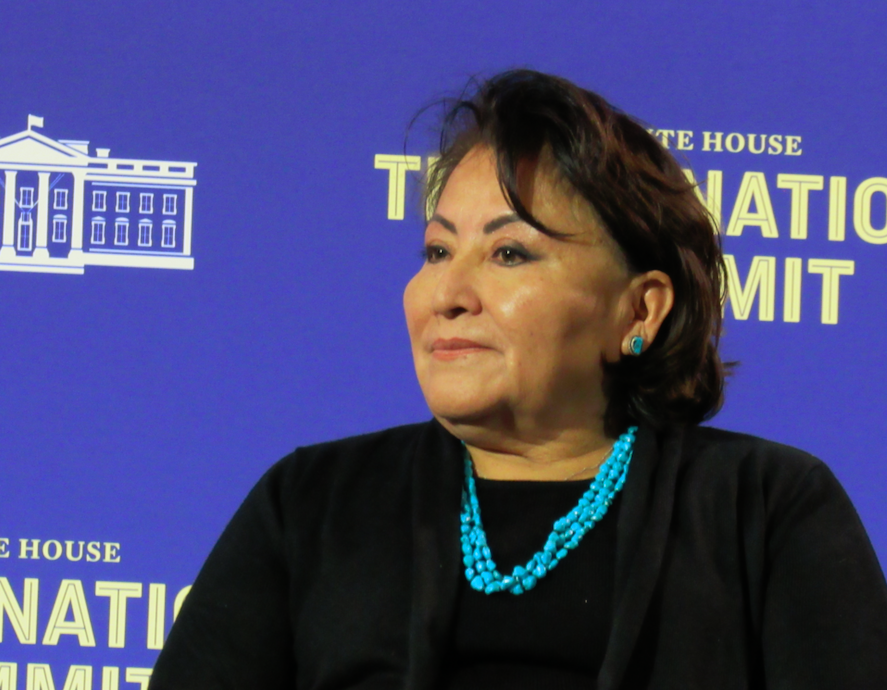
- Details
- By Roselyn Tso
I appreciated the opportunity to provide the committee with more information about the collaboration of the Indian Health Service and Veterans Affairs to provide both rural and urban Native veterans with access to quality, culturally appropriate health care and benefits. These efforts are critical, as American Indians and Alaska Natives serve in the U.S. military at a higher rate than any other group.
The IHS provides federal health services to approximately 2.7 million American Indians and Alaska Natives living across the United States — 145,000 of which are Native veterans. American Indians and Alaska Natives are disproportionately impacted by health disparities and have an average life expectancy five years shorter than the general U.S. population. In addition, our people are more likely than other races or ethnicities to experience social and economic difficulties that may impact health or wellness, such as lower income, education level, and higher unemployment. With a long, unique history of distinguished service to this country, American Indian and Alaska Native veterans remain at the forefront of an already marginalized patient population.
Through collaborative efforts, IHS will continue to work to bridge existing gaps and provide the equitable health care that Native veterans deserve. Health needs will change, and new approaches to care will emerge, but the IHS, VA and several other tribal partners will continue to combine our expertise and resources to provide them with the best possible services.
In my testimony, I provided the committee with an update on the Oct. 2021 memorandum of understanding between the IHS and Veterans Health Administration, which aims to improve the health status of American Indian and Alaska Native veterans through purposeful coordination, collaboration and resource sharing between the agencies.
I spoke about the ongoing process of creating a new operational plan that identifies specific goals and performance metrics now that the MOU has been executed. IHS is actively seeking valuable input from tribes and tribal organizations through meaningful consultation and conferring with urban Indian organizations on a draft operational plan. I also shared that annual tribal consultation and urban confer are essential to ensure ongoing involvement from tribal and urban Indian organization leaders across Indian Country.
Before closing my remarks, I shared with the committee that as a daughter of a Korean War veteran, I had the privilege of caring for my father toward the end of his life and understand firsthand the challenges of navigating between the IHS and the VA, which is why I have made improving care coordination for Native veterans a priority at the IHS.
I assured the committee that across IHS, we remain firmly committed to improving quality and access to health care for American Indian and Alaska Native veterans. We greatly appreciate the work being done to address the many unique challenges and barriers our veterans face, regardless of whether they are living on rural reservation lands or in major urban areas.
I want to thank the committee for their support and efforts to help provide the best possible healthcare services to the veterans we serve. Together, we will continue to find innovative and impactful ways to raise the physical, mental, social, and spiritual health of Native veterans to the highest levels.
You can read my full testimony or watch the full hearing online.
Roselyn Tso, an enrolled member of the Navajo Nation, is the director of the Indian Health Service. As director, Ms. Tso administers a nationwide healthcare delivery program that is responsible for providing preventive, curative, and community healthcare to approximately 2.7 million American Indians and Alaska Natives in hospitals, clinics, and other settings throughout the United States.
Help us defend tribal sovereignty.
At Native News Online, our mission is rooted in telling the stories that strengthen sovereignty and uplift Indigenous voices — not just at year’s end, but every single day.
Because of your generosity last year, we were able to keep our reporters on the ground in tribal communities, at national gatherings and in the halls of Congress — covering the issues that matter most to Indian Country: sovereignty, culture, education, health and economic opportunity.
That support sustained us through a tough year in 2025. Now, as we look to the year ahead, we need your help right now to ensure warrior journalism remains strong — reporting that defends tribal sovereignty, amplifies Native truth, and holds power accountable.
 The stakes couldn't be higher. Your support keeps Native voices heard, Native stories told and Native sovereignty defended.
The stakes couldn't be higher. Your support keeps Native voices heard, Native stories told and Native sovereignty defended.
Stand with Warrior Journalism today.
Levi Rickert (Potawatomi), Editor & Publisher

